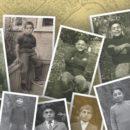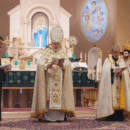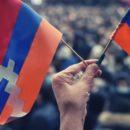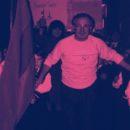Atom Egoyan delivers the keynote address during Zoryan gala event at the Granite Club of Toronto, April 7, 2018.
Oscar nominated filmmaker Atom Egoyan delivered a keynote address during the 35th anniversary celebration of the Zoryan Institute on April 7, 2018 in the Granite Clube, Toronto.
Here’s the full text of Egoyan’s speech.
——————————————-
My story with Zoryan begins with a love affair and a deep friendship.
First a torrid love affair…
But I’m getting ahead of myself.
There’s a lot about me you don’t know.
I didn’t study to become a filmmaker. I left the town I grew up in on the west coast of Canada to come to Toronto to study International Relations.
Yes, I wanted to become a diplomat. In fact, that’s all I studied for four years. But while I was studying to become a diplomat, I discovered that there was an Armenian students’ association on campus.
I started hanging out with these students and the rest is history.
I mean that quite literally. As I spent time with these young Armenians and I became more and more aware of the history of my people, I realized how little I really knew.
All I was really taught while I was growing up on the west coast of Canada in the city of Victoria was that Armenians made great food, that we were Christians, though we never went to Armenian church – there wasn’t any Armenian church – and that we hated the Turks.
Seriously, that’s all I knew. That we hated the Turks. I gradually found out about the genocide especially after my parents travelled to Armenia when I was fifteen and my father had an emotional breakdown at Tzitzernagaberd.
His mother was an orphan. No one knew what town or city she was from. I’ll never know that information, though I suppose genetic testing might someday give me the answer.
While I was at university I began to devote all my academic time to the study of the Armenian Genocide, especially as it related to international relations and diplomacy at the time.
My thesis was a comparison of Woodrow Wilson and Vladimir Ilyich Lenin’s views towards the idea of national self-determination, with a focus on the Armenian question.
In other words, I was a budding Armenian political science scholar until I put a film camera in my hands and decided what I really wanted to do with my life was to become a director. Which led to a torrid love affair and the Zoryan Institute.
But I’m still getting ahead of myself.
So, a few years after I graduated I made a super low budget feature film called Next of Kin and I met a brilliant and beautiful young woman who I cast as one of the lead actresses and well…the rest of all that is also history.
But that history took an unexpected turn when that woman – Arsinée Khanjian – met Kourken and Lena Sarkissian and the four of us became friends. That was a very long time ago, and you heard about that origin story earlier on.
Kourken, as one of the founding members, had already started the Zoryan Institute with his colleagues by the time we had met but it was only a few years old. He knew that I was interested in film and he was certainly interested in getting the brand of the Zoryan better known – he still is, which is why we’re all here tonight – so he came up with this brilliant idea. Why not send me to Cambridge, Massachusetts, to meet Jirair Libaridian and come up with a film about the Zoryan Institute.
That film was never made, but the time I spent in Cambridge was a revelation. The entire time I was working on my thesis about the Armenian question at university I felt I was academically alone. My two supervising profs were not really acquainted with the subject, and my only resources were the pioneering books by Richard Hovhannisian. And that, together with a few assorted articles in the Armenian Review, was about it.
But speaking with Jirair I suddenly felt that there was a community of Armenian scholars. These scholars and academics first began to conceive of the idea of the Institute in the late seventies.
They were all propelled by deeply felt intellectual concerns, and – in Kourken’ s own words “compelled by strong desire for change, we set about conceptualizing an Institution which would provide a forum for free and critical thinking about contemporary issues affecting the Armenian people through a process that was analytical, scholarly and detached”. According to Kourken, this process would include the continual and systematic re-examination and re-evaluation of our reality.
But that reality was to suddenly change in the most violent of ways.
What happens to an organization like Zoryan when – a few years after its formation – it needs to react to three extreme events which challenge its core mission?
What happens when a group of Armenians absorbed with questions about their history, their identity and their future as a nation are faced with three shocks that directly confront these circumstances?
Our history was rocked by the Sumgait massacres and its implications. Our identity was redefined by the independence of the former Soviet Republic. And our future was certainly challenged by the consequences of a devastating earthquake.
And let us remember that all three of these monumental events happened within a few short years and sometimes even months of each other.
It meant that the Zoryan Institute and its intellectuals were so consumed about how Armenians would express their history in their own voice that they perhaps didn’t fully understand the implications of the task that they had ahead of them.
All of Zoryan’s resources needed to be spent on the forces and factors that had brought the Armenian people to where they were, but where they were was about to change and shift in ways no one could have ever expected.
Not only were Armenians still in crisis mode about the Genocide, they had these three new crises – Sumgait and its implications, a crippling earthquake and its implications, and independence and its implications – to suddenly contend with.
From a community that had seen intellectual responses as something of a luxury, the Zoryan Institute sought to put academics into a position where they needed to develop intellectual ideas and provide for their practical applicability.
And let me state that the Zoryan Institute rose extraordinarily to fulfill this mission.
Not only was Zoryan there first with publications about Sumgait, it was also there with groundbreaking books like “Hitler and the Armenian Question”, “A Crime of Silence”, and magnificent contributions by academics like Vahakn Dadrian, Yair Auron, Roger Smith and of course Taner Akçam. I will never forget the day I received this book – “Essays Towards a Turkish – Armenian Dialogue”- and this beautiful inscription from Taner – “to Atom and Arsinée – my dearest comrades of the same struggle”. Imagine what this meant to me – this person who was raised to be deeply suspicious of Turks – to have Taner Akçam refer to us as comrades in the same struggle.
And this was just the beginning.
Over the past almost 20 years Zoryan – through initiatives such as the Genocide And Human Rights University Program – which has almost five hundred students from 41 countries – has been committed to what I consider a most radical and unprecedented dialogue.
While it was crucial in helping to organize early groundbreaking conferences like Problems of Genocide in Yerevan in 1995, it has also – since its very beginnings – launched an Oral Histories Project which has recorded some 700 survivors’ stories. It has published dozens of books and two international periodicals with some 540 peer-reviewed articles from several countries addressing transnational issues related to genocide and diaspora studies.
And now we are here to celebrate the 35th birthday of this cherished organization, and you are all here to honour this event.
So, what is left to do?
As I said before, it’s quite possible that Zoryan and its devoted believers have been so consumed with the Institute’s birth from an unbelievable crucible of Armenian Issues – from genocide recognition, to new massacres against our people, to devastating earthquakes to the monumental achievement of State Independence – that we haven’t really given ourselves the time to fully reflect on what Zoryan must now shift its attention towards. And I’m here to give you all the answers in the few of minutes that I have left up here.
But seriously, I think it’s very important that we understand something about the new world we’re in and Zoryan’s crucial role. When I was young, I was hugely influenced by George Orwell. more than his most famous books like “1984” and “Animal Farm”, I was tremendously excited by “Homage to Catalonia”, his account of the Spanish Civil War.
I first read this brilliant and prophetic book when I was a teenager, before I went to university and took the deep plunge into Armenian political history. Listen to this quote from Orwell’s book, writing from the front lines of the Spanish civil war… “Early in life I have noticed that no event is ever correctly reported in a newspaper, but in Spain, for the first time, I saw newspaper reports which did not bear any relation to the facts, not even the relationship which is implied in an ordinary lie. I saw great battles reported where there had been no fighting, and complete silence where hundreds of men had been killed. I saw troops who had fought bravely denounced as cowards and traitors, and others who had never seen a shot fired hailed as the heroes of imaginary victories. I saw eager intellectuals building emotional superstructures over events that never happened. I saw history being written not in terms of what happened, but what ought to have happened according to various party lines.”
Orwell went on to conclude that he was… “Willing to believe that history can be inaccurate and biased, but what is peculiar to our age is the abandonment of the idea that history could be truthfully written. This kind of thing is frightening, because it gives the feeling that the very concept of objective truth is fading out of world…”
Armenians had of course seen objective truth fading out decades before Orwell reported this phenomenon in Spain. For over a hundred years we’ve been at the forefront of this question – of what constitutes truth and how it can be manipulated – and now we find ourselves living in a moment where fake news has become a casual term. Not only has Orwell’s observation become our truth, but we might have found ourselves on the cusp of a time where we understand and accept that history is fully defined by the careful alignment of competing agendas.
The Armenian experience is older than the experience of the Spanish civil war. While we have acknowledged the victors and the victims In Spain – we understand the breakdown of the left – the Trotskyites, the Communists and the splintered Socialists on one side and the Nazis and the Franco’s fascists on the other – we as Armenians are still living with the ghosts of our history. We have been living with competing agendas for over a century.
Before I spoke about the years right after the formation of Zoryan, and how they became a crucible for its identity. There is a similar moment happening around us now, and Zoryan must take advantage of its unique position. We must understand that in a world of fake news and fiercely competing agendas, Zoryan has branded itself as a place where issues of atrocity and its state-sponsored narratives have been analyzed for 35 years. This intense study and our hundreds of students and scores of books and related projects have given us this unique position. Wouldn’t it be wonderful if Zoryan could become a go-to source for understanding when rights have been violated and to what extent? Why have those rights been violated? What is the context from which to understand those actions which have led to those transgressions?
My dream of what Zoryan is capable of in the future is to one day see a news report and go to the Zoryan Institute for a deeper understanding of why this has occurred. What better organization to represent this question than an Institute which has built its reputation on bringing together the two most separate views of a contested historical event, whilst all the time dealing with a state government which continues to deny? Orwell feared that these sorts of lies – these examples of monumental fake news – would pass into history, and Zoryan – brilliantly – has triumphed in resisting this tendency though its unique prism, dealing with the first mediated major human right catastrophe of modern time.
Yes, of course we are beyond genocide – we need to be beyond genocide – but the fact that we are even able to say that – that we are beyond genocide – is the very essence of our condition. It is what we have learned from, and it’s what we must share with the rest of the world. There is no conclusion to our story and this has made us who we are. We have become “beyond genocide” because of a methodology we have imposed on ourselves and we must now be generous and committed to sharing with others.
We understand that the fundamental means by which human rights can be violated is by the abstraction of other human lives. We understand that to counter this continued process of abstraction, we must be ultra clear-minded and vigilant.
The Zoryan Institute is our carefully measured response. Our grandparents could never have had a carefully measured response. It is something we have had to learn, something we have had to develop. What Zoryan has done in the past 35 years has been truly monumental.
Zoryan has been committed to a compassionate mission of revealing the truth.
There are a lot of hard truths coming our way. Human rights issues will certainly be at the forefront as we deal with the pressures of Artificial Intelligence on the workforce, climate change, and huge shifts in population. These monumental issues will test the limits of what we might call our human capital. Our ability to feel empathy and extend ourselves to others.
Going into the future, let’s see Zoryan as a sort of intellectual empathy machine, extending its practices to a myriad of new issues but always through the prism of our collective experience.
Compassion cannot exist if one’s efforts are used to conceal. As Armenians, we understand this profoundly and – through this wonderful organization, we have the means to collectively share what we’ve learned and – just as importantly – what others have taught us.
I began by saying this all started with a torrid love affair and that’s exactly how I’ll end it tonight.
I love the Zoryan Institute, and I love the man behind this all. Let’s applaud the vision, persistence and tremendous impact that Kourken has made.





